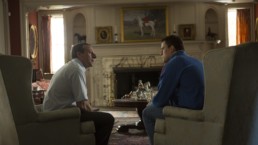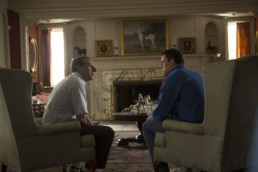Review: ‘Foxcatcher’
Director Bennett Miller leads a fearless cast into new and demanding territory in this modern-day American tragedy.
In the none-too-distant past of late nineteen-eighties America and its settling, fading Reaganism, a former and forgotten Olympic Gold Medal-winning wrestler, Mark Schultz, was approached by a private investor and old-money heir, John du Pont, of the du Pont family fortune, who offered to sponsor Mark’s training efforts so that together, they could become victors of the 1998 Olympic Games in Seoul. Mark was taken in to train, and live, on the sprawling du Pont Pennsylvania countryside estate. The name of the compound, was Foxcatcher Farms.
While you might already know the devastating aftermath of what this real-life relationship would bring in its wake, you won’t have imagined its story told quite like this; quite so acutely distressing–if not just on this side of overly-restrained, in director Bennett Miller‘s latest film, Foxcatcher.
In telling this real-life story, Foxcatcher employs a wide variety of expectations-deviating elements, including bucking the traditional sports-biopic-murder story–its interests lie in broader, more thematically engulfing and idea-presenting territory. Miller enlists here the acting talents of a careful selection of some of Hollywood’s most currently coveted film starrers–who also all seemed to be wanting to scratch the same acting-itch at the same time in their careers, for stepping into these characters required a good amount of evaluation and preparation as to the exhaustive, destructive journey that would lie ahead, and were collectively unsure if they would be better in the end for doing so (Read Ryan’s interview with the cast, director, and screenwriters, who talked at length about the emotionally turbulent film-making process.) In a seismically charged one-two punch, Channing Tatum gives his most intense and best on-screen performance to date yet as Mark Schultz, and Steve Carell loses himself (attempting to, in the most acknowledged version possible) as the upper-class outsider John du Pont, with Mark Ruffalo as the film’s more personable life-force, older brother to Mark and former wrestling champ himself, Dave Schultz.
Mr. Miller seems to revel in taking his inspiration in the form of channeling Foxcatcher Farm’s dead-moving and thickly-engulfing morning fog that wraps each character and prop and film frame into an impressionistic version of itself.
To understand a film like this–a real-life tale spun deftly off-kilter as an American tragedy of history’s greatest and modern and faulted men–is to know the films of director Bennett Miller. While his name, or films, might not revel in the same excited movie conversation amongst typical movie-goers, it is to his strength that his focus is on circumventing conventional narrative-telling, in the sense that ‘scenes’ find their importance and meaning more-so in their conclusions, in the next scene’s beginnings and first shots, so that things can align for meaning only when looked back upon, and definitely appreciated as the sum of its parts (at least it’s that way here, excessively so). Stubborn wouldn’t be the correct word, for how he chooses to so joyfully deny the audience their expected place in steering the cart while chipping away at his films’ meanings–but it comes close.
What’s interesting about this film is that it’s set up for any educated viewer to understand that there’s just so much gold to mine here that isn’t being seen or known. This is a film of silences, whether when framing Mark and his early kinetic anger, who is seen early on getting by talking to apathetic middle-school assemblies for hamburger food, and what those moments speak larger of. Seeing du Pont’s almost-humorous actions of ordering a tank from the indebted U.S. government, yet not accepting it without it’s mounted machine gun, are mere instances of being given the close-up of the trees, where audiences will have to forcibly step back and acknowledge the larger forest that encloses them. This choosing to leave open the ideas that populate these odd-ball situations gives way for interesting realism and freedom, but it still never puts its finger on any one idea, which is this film’s problem. And what small and very real miracles the film does employ in each scene, consistent in relief and management (to its praise), Mr. Miller seems to revel in taking his inspiration in the form of channeling Foxcatcher Farm’s dead-moving and thickly-engulfing morning fog that wraps each character and prop and film frame into impressionistic versions of themselves. Fear and bubbling animal instinct is dulled, as a result, as if the concern that connecting these historical dots would convey a sense of easiness, which this director seems himself terrified of doing.
It is for this same point, however, that the film stands as something unique and singular, among modern-day films whose studio heads and financiers would find themselves clearing their desks Monday morning over. This is filmmaker-champion Megan Ellison‘s (Annapurna Pictures) big-scale home movie–and to be honest–we as a movie-going audience are all the better for it. This is last year’s Inside Llewyn Davis, a film that was undoubtedly made with real artistic awareness yet similarly quietly hushed for its universal inaccessibility (a film that I believed was worthy of last year’s Best Picture Oscar). It’s a filmmaker’s movie, a “movie person’s” movie, which means to say, it should be praised for what it sets out to achieve, rather than what it actually does.
Gorgeous camera work further works in this artist’s favor for his choice of storytelling. What starts out as a more documentary-like photographing (Miller’s first film being a documentary, 1998’s The Cruise), becomes something ever so subtly grown into a more tunnel-visioned disorientation (look for how the growing mental instabilities of Mark and du Pont are referenced in its evolving and more lofty camerawork, including an enormous wide shot of Mark zig-zagging wrestling moves on the estate’s frame-filling lawn, similar to Kubrick’s penchant of creating trapping and fated set pieces such as in Barry Lyndon and The Shining). Sound designs grows uglier and more confrontational as the film wears on, including the raw knuckle-punching and mirror-smashing of a Tatum untamed in a one-take show-stopper. In fact, there are so many things that the filmmakers did behind the scenes that the audience might never know. Like how the actors were directed to improvise in most scenes (“Ornithologist, Philatelist, Philanthropist…”), as much as twenty to thirty percent, according to Ruffalo. As well as Miller’s direction for having his actors write down their most private secrets, of which weren’t known even to their spouses, and kept in their pockets during shooting- so that they wouldn’t ever feel too comfortable on set. The million-dollar question is- do these incredible techniques come together to make for a great picture, or are they misaligned in fulfilling a different satisfaction? (At the moment, I myself am not even sure, but I raise the point).
I’m sorry–did you want out of this more specifics? Would you rather have had more tangible forms of evidence provided to you to weigh out this film from? Has this rolling commentary, more concerned with world-framing then with world-explaining, denied your expected takeaway of what this review would be? Then I’d argue that this is the head-space you should prepare yourself for before seeing (and it’s no doubt that this is a film to be seen) and taking in this masterfully performed, gorgeously shot, expertly-directed, if only too tragically and inwardly-trapped, modern day master-work attempt.
Foxcatcher is in theaters Friday, November 14th.
Ryan Rojas
Ryan is the editorial manager of Cinemacy, which he co-runs with his older sister, Morgan. Ryan is a member of the Hollywood Critics Association. Ryan's favorite films include 2001: A Space Odyssey, The Social Network, and The Master.


